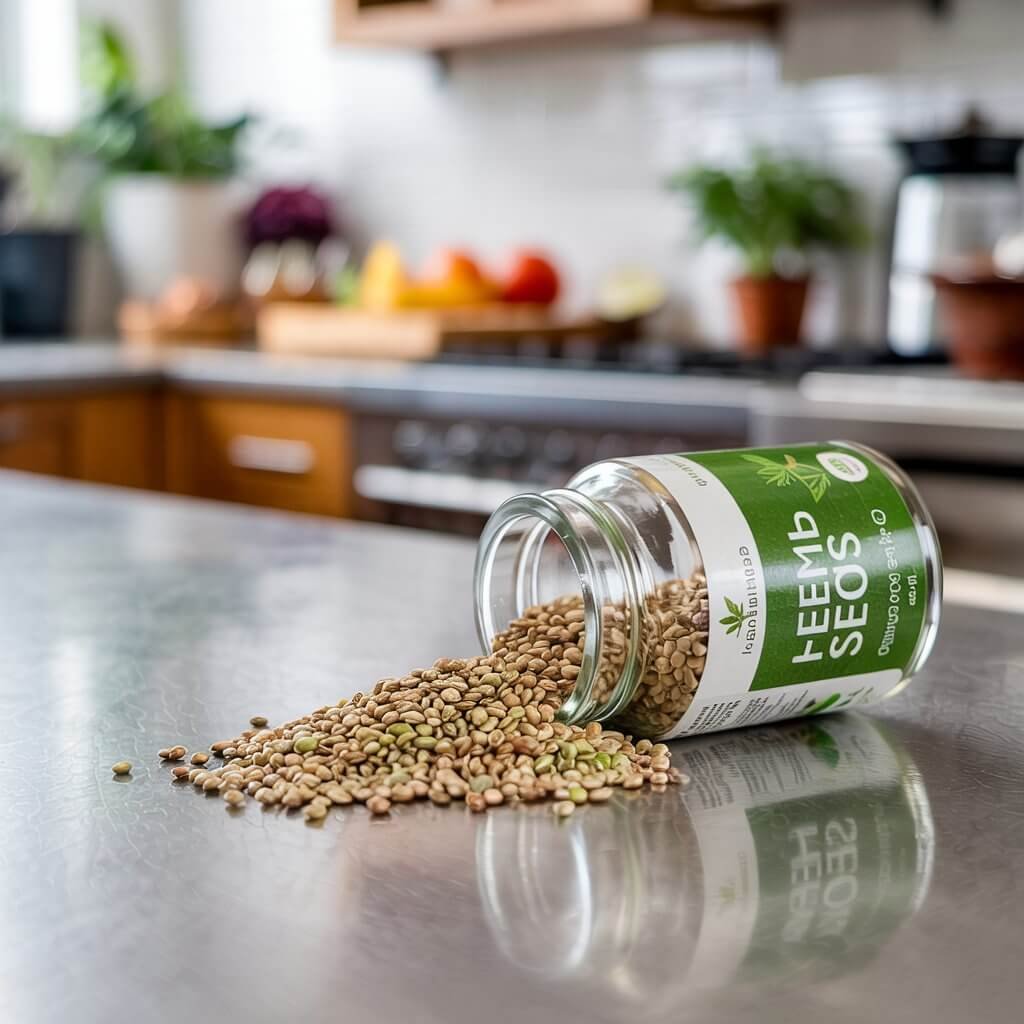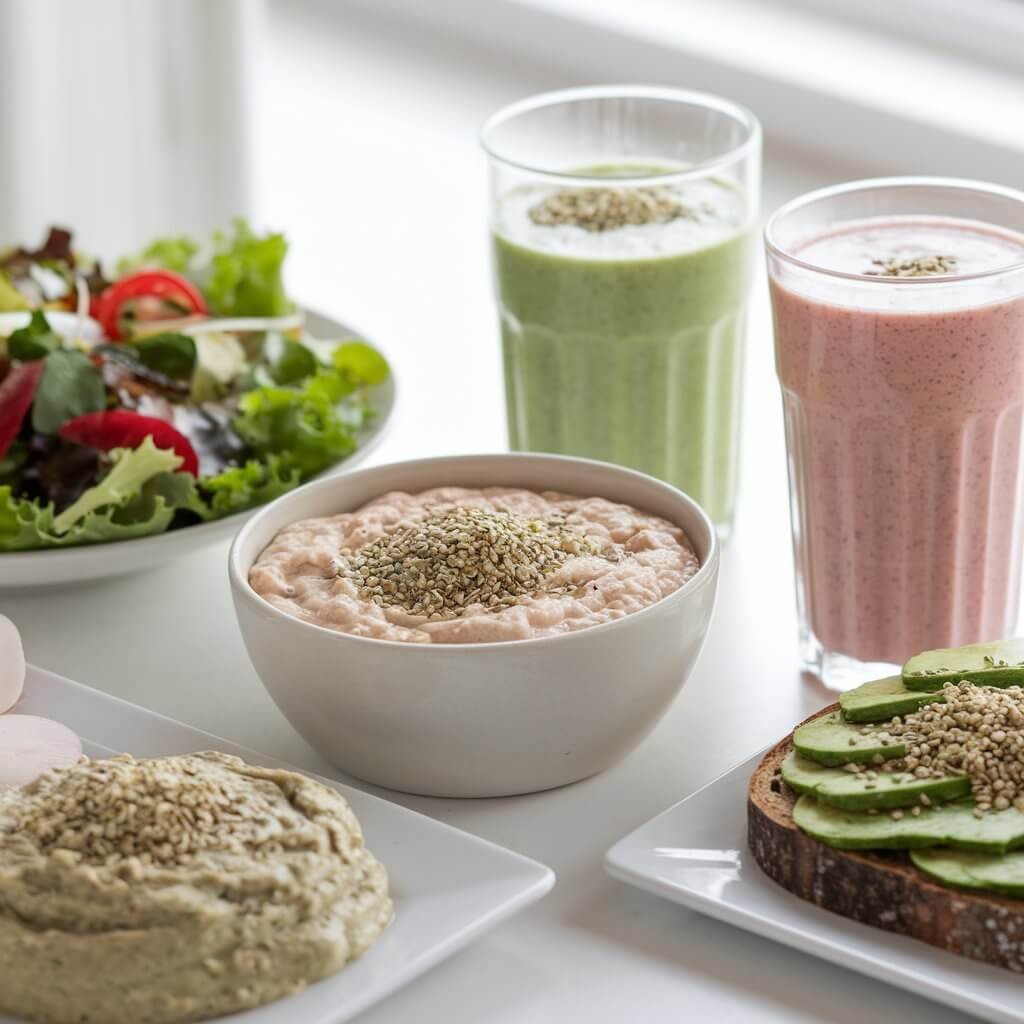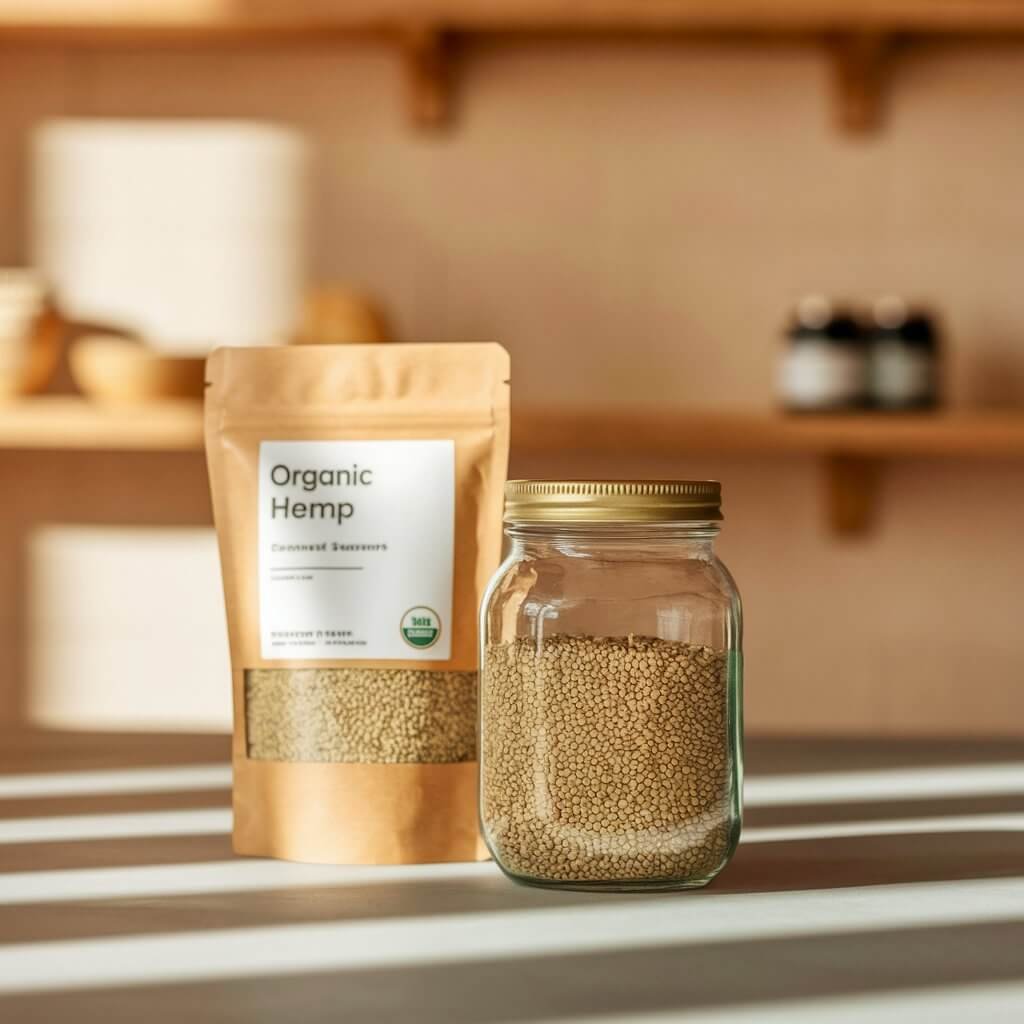Explore Healthy Living
In the world of superfoods, hemp seeds are often overshadowed by chia or flax — but these tiny seeds pack a serious nutritional punch. Whether you’re looking to boost your protein intake, support heart health, or simply add more wholesome ingredients to your diet, hemp seeds are a smart and versatile choice.
Derived from the Cannabis sativa plant, hemp seeds are nutty, soft, and completely free of psychoactive compounds like THC. That means you get all the health benefits without any of the “high.” Rich in essential fatty acids, protein, fiber, and key minerals, they’re a powerhouse ingredient worth knowing.
In this guide, we’ll break down everything you need to know about hemp seeds — from their impressive nutritional profile to the wide range of health benefits they offer. Plus, we’ll show you just how easy it is to incorporate them into your everyday meals.
What Are Hemp Seeds?

Hemp seeds, or hemp hearts, are the edible seeds of the Cannabis sativa plant. While they’re related to marijuana, they contain only trace amounts of THC—the psychoactive compound—so they won’t get you high. In fact, food-grade hemp is cultivated to be THC-free and is completely safe and legal to consume in most places.
These tiny, soft seeds have a mild, nutty flavor—often described as a mix between sunflower seeds and pine nuts. They’re usually sold hulled (as hemp hearts), which improves digestibility and texture. You can eat them raw, roasted, or ground, and they work well in both sweet and savory dishes.
Historically used for their fiber and oil, hemp seeds have recently gained recognition for their exceptional nutritional value. They’re rich in protein, healthy fats, and essential nutrients, making them a popular choice for plant-based and health-conscious diets.
Hemp is also incredibly eco-friendly. It grows fast, requires few chemicals, and helps improve soil health, making it a sustainable option for environmentally aware consumers.
In short, hemp seeds are a safe, nutritious, and versatile superfood with deep roots and modern appeal—ready to upgrade your daily meals with minimal effort.
Nutritional Profile of Hemp Seeds
Hemp seeds are small, but don’t let their size fool you — these little super seeds are densely packed with vital nutrients. Just a few spoonfuls can deliver a rich dose of protein, healthy fats, fiber, and key vitamins and minerals that support overall health.

Let’s break it down:
Macronutrients (Per 3 tablespoons / 30 grams):
- Calories: 166
- Protein: 10 grams
- Fat: 15 grams (with 12 grams being healthy unsaturated fats)
- Carbohydrates: 2 grams
- Fiber: 1 gram
This ratio makes hemp seeds an ideal choice for those seeking a plant-based protein source. In fact, hemp seeds contain all nine essential amino acids, which are the building blocks of protein that the body can’t produce on its own. This makes them a complete protein — something rare in the plant world.
Healthy Fats:
Hemp seeds are rich in essential fatty acids, including omega-3 and omega-6 fats in an ideal 3:1 ratio. This balance supports heart health, reduces inflammation, and contributes to brain and skin function. They also contain gamma-linolenic acid (GLA), a type of omega-6 fatty acid known for its anti-inflammatory properties.
Key Vitamins & Minerals:
- Magnesium – essential for muscle function, energy production, and nervous system support
- Phosphorus – aids in bone health
- Iron – supports red blood cell formation
- Zinc – promotes immune function and skin health
- Vitamin E – a powerful antioxidant that protects cells from damage
Despite their high fat content, the fats in hemp seeds are heart-healthy and beneficial, particularly for individuals following low-carb, paleo, or plant-based diets.
Hemp seeds are also easy to digest, especially in their hulled form, which is another reason they are favored over other plant-based proteins like legumes or grains.
Whether you’re an athlete, vegan, or just looking to eat more nutrient-dense foods, adding hemp seeds to your meals can significantly enhance your overall nutritional intake.
Top Health Benefits of Hemp Seeds

Hemp seeds are more than just nutritious — they actively support various areas of your health. Thanks to their powerful nutrient composition, these seeds can help your body thrive in multiple ways.
1. Supports Heart Health
Hemp seeds are an excellent source of omega-3 and omega-6 fatty acids, particularly alpha-linolenic acid (ALA), which helps reduce inflammation and maintain healthy cholesterol levels. The presence of arginine, an amino acid found in hemp protein, helps your body produce nitric oxide — a compound that relaxes blood vessels and reduces blood pressure. This combination makes hemp seeds beneficial for heart health and circulation.
2. Boosts Protein Intake
Containing all nine essential amino acids, hemp seeds are a rare example of a complete plant protein. This makes them especially valuable for vegetarians, vegans, and those cutting back on animal products. Just 3 tablespoons of hemp seeds provide about 10 grams of protein — perfect for muscle repair, hormone regulation, and immune function.
3. Aids Digestion
Hemp seeds contain both soluble and insoluble fiber, particularly in the whole seed form (with the hull). Soluble fiber feeds beneficial gut bacteria and helps regulate blood sugar, while insoluble fiber promotes regular bowel movements and overall digestive health. While hulled hemp hearts have less fiber, they are still easier on the stomach and easier to incorporate into meals.
4. Improves Skin Health
Thanks to their rich omega-3 and GLA content, hemp seeds may help reduce dryness, itchiness, and even eczema symptoms. These healthy fats nourish your skin from the inside out, helping it retain moisture and combat inflammation.
5. Balances Hormones
Some research suggests that GLA in hemp seeds may support hormonal balance, especially in women. It may help ease symptoms of PMS and menopause by reducing inflammation and supporting hormone-regulating pathways.
6. Strengthens the Immune System
Zinc and vitamin E, both present in hemp seeds, are essential for maintaining immune strength and protecting your cells from oxidative stress.
From head to toe, hemp seeds offer a natural and nutrient-rich way to improve your health. Up next, we’ll look at how you can start using them in everyday meals.
How to Use Hemp Seeds in Everyday Meals
One of the biggest advantages of hemp seeds—aside from their stellar nutritional value—is their versatility in the kitchen. Their mild, slightly nutty flavor makes them easy to incorporate into virtually any meal, whether you’re whipping up breakfast, lunch, dinner, or snacks. And because they don’t require cooking, prep time is minimal. You can simply sprinkle, blend, stir, or mix them in.
Whether you’re following a plant-based diet, trying to eat cleaner, or just looking to add more nutrients to your meals, hemp seeds can help elevate your food without a ton of effort.
Here are a variety of ways to start using hemp seeds in your everyday meals:

1. Add to Breakfasts for a Nutrient Boost
Mornings are the perfect time to fuel your body with hemp seeds. Just 1 to 2 tablespoons added to your breakfast can provide a good dose of protein, omega-3s, and fiber to keep you energized and full.
Ideas to try:
- Oatmeal: Stir hemp seeds into warm oats or sprinkle on top of overnight oats.
- Smoothie bowls: Blend them into the smoothie base or use as a topping with fruit and granola.
- Yogurt parfaits: Mix into Greek or plant-based yogurt with berries, chia seeds, and a drizzle of honey.
- Pancakes and waffles: Fold into the batter for a nutritional upgrade or use as a topping after cooking.
2. Sprinkle on Salads and Grain Bowls
Hemp seeds are a great finishing touch for salads and bowls. They add texture, a light crunch, and earthy flavor that blends beautifully with vegetables, grains, and dressings.
Serving ideas:
- Sprinkle on top of mixed green salads with avocado and lemon vinaigrette.
- Add to Buddha bowls with quinoa, chickpeas, roasted sweet potatoes, and tahini sauce.
- Top off rice or couscous dishes with a spoonful of hemp seeds and herbs.
3. Blend into Smoothies and Protein Shakes
If you’re a fan of smoothies or protein shakes, hemp seeds make a fantastic add-in. They blend easily and contribute healthy fats, protein, and fiber—all without overpowering the flavor.
Blend with:
- Almond milk, banana, spinach, and peanut butter
- Berries, Greek yogurt, and oats
- Coconut water, mango, and turmeric
For extra creaminess and nutrition, blend 2 tablespoons of hemp seeds with your usual smoothie ingredients.
4. Stir into Baked Goods and Energy Snacks
Hemp seeds can be added to homemade baked goods and no-bake snacks for a nutritional edge. They don’t change the taste dramatically, but they do contribute to the overall texture and nutrient content.
Try adding hemp seeds to:
- Muffins, banana bread, or healthy cookies
- Granola or cereal bars
- Homemade protein balls or energy bites
- Baked oatmeal or breakfast bars
For energy bites, mix hemp seeds with oats, peanut butter, honey, and flaxseed, then roll into snack-sized balls.
5. Use in Sauces, Dressings, and Spreads
Hemp seeds can easily be blended into creamy sauces and dips, acting as a nutrient-dense substitute for nuts or cream. Their texture creates a rich and smooth consistency, perfect for dressings and spreads.
Delicious hemp-based ideas:
- Hemp seed pesto: Swap out pine nuts for hemp seeds in your favorite pesto recipe.
- Hemp hummus: Add a tablespoon to your traditional hummus for more protein and creaminess.
- Creamy salad dressing: Blend hemp seeds with olive oil, lemon juice, garlic, and herbs.
- Hemp milk: Blend 1/2 cup hemp seeds with 2 cups of water for homemade dairy-free milk—strain if desired.
These options are great for anyone looking for nut-free or dairy-free alternatives in the kitchen.
6. Top Off Soups, Toasts, and Warm Dishes
Hemp seeds can be used as a garnish in the same way you’d use sesame seeds or chopped nuts. They provide a gentle crunch and a touch of richness to warm or savory dishes.
Easy topping ideas:
- Sprinkle on top of creamy soups like tomato, butternut squash, or lentil.
- Add to avocado toast for a superfood boost.
- Use as a topping for stir-fried veggies, roasted potatoes, or baked tofu.
You can even sprinkle them over pizza or pasta dishes just before serving to elevate the texture and nutritional profile.
7. Use in Meal Prepping and Batch Cooking
Because hemp seeds store well and don’t need cooking, they’re great for prepping ahead. You can mix them into large batches of granola, overnight oats, salad jars, or smoothie freezer packs to make healthy eating quick and easy during the week.
Quick Tips for Using Hemp Seeds:
- Start small: If you’re new to hemp seeds, begin with 1 tablespoon per meal and build up.
- Store properly: Keep them in an airtight container in a cool, dry place or refrigerate for longer freshness.
- Combine for more benefits: Pair with chia seeds, flaxseeds, or nuts for a well-rounded mix of healthy fats and fiber.
Hemp seeds are one of the easiest superfoods to work into your diet—no fancy cooking, no long prep time, and no overpowering flavor. From breakfast to dinner (and everything in between), there are endless ways to enjoy their powerful health benefits while making your meals more satisfying and nutritious.
Hemp Seeds vs. Other Super Seeds
Hemp seeds are often grouped with other so-called “super seeds” like chia seeds, flaxseeds, and pumpkin seeds—but how do they truly compare in terms of nutrition, usability, and health benefits?
Protein Power
Among super seeds, hemp seeds are the clear winner in protein content. Just three tablespoons (30 grams) of hemp seeds contain around 10 grams of complete protein, meaning they offer all nine essential amino acids your body needs. Neither chia nor flaxseeds offer complete protein and typically provide about 4–5 grams of protein per three-tablespoon serving.
If you’re looking for a plant-based protein source that requires no cooking and blends well into any dish, hemp seeds are hard to beat.
Omega Fatty Acids
All three seeds—hemp, flax, and chia—are rich in omega-3 fatty acids, which are crucial for brain health and reducing inflammation. However, hemp seeds have a more balanced omega-6 to omega-3 ratio (about 3:1), which is ideal for heart health. In contrast, flaxseeds and chia seeds tend to be heavier in omega-3s but can sometimes skew the ratio if not balanced with other fats.
Fiber Content
If you’re prioritizing fiber, chia and flaxseeds take the lead. Chia seeds especially are rich in soluble fiber, which helps promote gut health and satiety. Hemp seeds, on the other hand, are lower in fiber—unless you consume them with the hulls (outer shells), which most people don’t. Still, they offer enough to contribute to a balanced diet when combined with fruits and vegetables.
Ease of Use
Hemp seeds score high in convenience. Unlike flaxseeds, which need to be ground for full nutritional benefit, or chia seeds, which require soaking to avoid digestive discomfort, hemp seeds are ready to eat straight out of the bag. You can sprinkle them on any dish without altering texture too much or needing preparation time.
Nutrient Variety
While all these seeds are nutrient-dense, hemp seeds contain more zinc, magnesium, and iron per serving than chia or flaxseeds. They’re particularly great for supporting energy levels, hormonal balance, and immune function.
The Verdict
Each of these seeds has its strengths:
- Chia seeds are best for hydration and fiber.
- Flaxseeds are excellent for digestion and hormone balance.
- Hemp seeds are the most well-rounded, especially for those looking for plant-based protein, omega-3s, and mineral support.
Ideally, include a variety of seeds in your diet. But if you had to choose just one to keep in your pantry, hemp seeds might be the most versatile, nutrient-rich choice available.
Buying and Storing Hemp Seeds
With hemp seeds growing in popularity, they’re now widely available in health food stores, grocery chains, and online. But when it comes to choosing high-quality hemp seeds and storing them properly, a few tips can make a big difference in freshness and nutrient retention.

What to Look for When Buying
1. Go for organic and non-GMO:
Hemp seeds labeled organic and non-GMO are produced without synthetic pesticides or genetic modifications, which is better for your health and the planet.
2. Choose hulled hemp seeds (hemp hearts):
Most people prefer hulled seeds, which have had their tough outer shell removed. They’re softer, easier to digest, and more versatile for everyday meals.
3. Check the packaging date:
Hemp seeds contain delicate oils, especially omega-3s, which can go rancid if stored too long. Always check the expiration date or best-by date before buying.
4. Sealed, light-proof packaging:
Look for vacuum-sealed or opaque packaging. Exposure to air and light can degrade the nutrients and shorten shelf life.
Storage Tips for Maximum Freshness
Hemp seeds contain healthy fats that can go rancid if not stored properly. Follow these tips to keep them fresh and tasty:
- Refrigerate after opening: Store them in an airtight container in the refrigerator for the longest shelf life—typically up to 1 year.
- Freezing is also an option: For bulk purchases, divide hemp seeds into smaller portions and freeze them to prevent spoilage.
- Avoid moisture and heat: Keep them away from the stove or dishwasher where heat and humidity can cause deterioration.
How to Know if They’ve Gone Bad
Rancid hemp seeds will have a bitter, fishy smell instead of their usual nutty aroma. If the seeds taste off or the oils smell sour, it’s time to toss them.
Pro Tip:
To preserve their nutritional value, avoid cooking hemp seeds at high temperatures. Instead, add them as a garnish or stir them in after your dish is cooked.
Potential Side Effects and Considerations
While hemp seeds are generally safe and beneficial for most people, it’s important to be aware of a few potential side effects and considerations before making them a regular part of your diet.
Digestive Changes
For those new to high-fiber foods or omega-rich seeds, adding too many hemp seeds too quickly may cause:
- Mild digestive discomfort
- Bloating
- Loose stools
To avoid this, start with 1 tablespoon per day, and gradually increase as your body adjusts.
Calorie Content
Though nutrient-dense, hemp seeds are also calorie-dense, providing about 170 calories per 3 tablespoons. If you’re watching your calorie intake for weight management, be mindful of portion sizes. Small amounts still deliver great nutritional benefits.
Medication Interactions
Hemp seeds are generally low in THC (the psychoactive compound in cannabis) and are considered safe, but they may mildly interact with blood thinners or anticoagulants due to their fatty acid content, which can affect blood viscosity.
If you’re on medication, especially for blood pressure, cholesterol, or blood clotting, it’s best to:
- Consult your healthcare provider before consuming large amounts.
- Start small and monitor how your body reacts.
Allergic Reactions
Although rare, some people might experience an allergic reaction to hemp seeds. Symptoms can include:
- Skin rash
- Itching
- Digestive upset
If you’re trying hemp seeds for the first time, start with a small amount and watch for any signs of intolerance.
Why Hemp Seeds Deserve a Spot in Your Pantry
Hemp seeds are a simple yet powerful way to boost your nutrition. Packed with complete protein, healthy fats, and essential minerals, they support everything from heart health to energy levels—all without needing any fancy prep or cooking.
What makes them truly stand out is their versatility. Whether you’re blending them into smoothies, sprinkling them on salads, or stirring them into oatmeal, hemp seeds fit effortlessly into any meal or diet. They’re an easy win for anyone looking to eat cleaner and feel better.
If you’re aiming for a more natural, balanced approach to nutrition, hemp seeds are a small change that can make a big difference. Keep a bag on hand and start adding a spoonful a day—you’ll be surprised how quickly your body thanks you.




